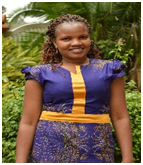The department of Agricultural Economics wishes to congratulate the following eleven masters graduates who worked hard and managed to graduate in the UoN 63rd graduation ceremony.

Name : Rexford Akrong
Abstact : Smallholder farmer participation in high value markets is critical to increasing farm income given that these markets offer the highest prices. However, access to and the level of participation in high value markets by small-scale mango farmers in Ghana is low. The study used a triple-hurdle model to capture a three-step decision-making process involved in participating in export markets by 224 small-scale mango producers who were randomly selected in Southern Ghana. The results from the estimation of the triple-hurdle model showed that participation in high value mango markets was influenced by education, household income, farming experience, ownership of a motorized transport, ownership of a radio, trust, distance to nearest tarmacked road, certification and access to credit. The level of participation in mango export markets as a case of high value markets was determined by household size, household income, farming experience and access to credit. Based on the study findings, it is recommended that institutional support including certification and credit should be provided to smallholder mango farmers. This institutional support should be coupled with practical-based education and training to ensure that the farmers meet the stringent requirements of high value markets and, consequently, increase their participation and the level of participation in high value markets. Further, to ensure market efficiency and enhance smallholder farmer participation in competitive markets, the study recommends the reduction of transaction costs through the provision of equipment, such as motorized transport and radio; and the encouragement of transparency between trading partners to enhance trust between them.

Thesis Title : Analysis Of The Socio-Economic Contribution Of Donkeys Ownership And Use To Household Livelihoods In Kiambu County.
Abstract : Donkeys play an important role in household livelihoods, especially among rural and peri-urban households. However, donkeys continue to face numerous challenges, including; disease, injuries and mistreatment. This is attributed to a lack of attention from policy makers and livestock programs. Empirical literature on the contribution and livelihood linkages of donkey use is a potential pathway to inform policy. This study sought to quantify and document the contribution of donkeys on household livelihoods using the sustainable livelihood approach (SLA) in Kiambu County. Economic returns from ownership and use of donkeys were assessed using gross margin analysis. A multiple regression model was then applied to assess the effect of donkey welfare indicators and household socio-economic factors on annual donkey returns. A Tobit model was estimated to analyze the effect of donkey use on household female labor time.
The findings showed that donkey ownership was a profitable venture; with an average return on investment of Kshs 6 per shilling invested. The results also showed that donkey ownership significantly reduces the amount of time female persons spend on household chores. The study concluded that, donkey welfare is inextricably linked with welfare of their users, while lack of attention to donkey welfare negatively affect the welfare of donkey users. The study, therefore, recommends the need to enhance donkey welfare at all levels including policy and livestock program priorities. Finally, donkey promotional programs should focus on female-headed households for maximum contribution

Name : Arnold Missiame
Thesis Title : Impact of Rural and Community Bank Credit Access on Technical Efficiency of Smallholder Cassava Farmers in Fanteakwa District of Ghana
Abstract : Cassava is an important staple food in Ghana, both in terms of quantity produced and quantity consumed. Increases in the output of the crop, in recent years, have been attributed to increases in land size rather than intensification. This situation has been blamed partially on the low use of improved inputs among smallholder farmers who dominate the country’s agriculture. The low use of improved inputs has been attributed to the persistent lack or limited access to credit among smallholder farmers. Rural and Community Banks (RCB) were established with the sole aim of enhancing rural entrepreneurs’ access to financial services, and particularly credit. It was envisaged this would improve farm productivity. However, there is little knowledge on what impact cassava farmers’ access to RCB credit has on their technical efficiency. The study sought to fill this gap in knowledge.
The multistage sampling technique was used to select 300 smallholder cassava farm households in the Fanteakwa District in the Eastern Region of Ghana. The stochastic frontier and endogenous switching regression models were employed in analysis of the data.
Overall, RCB credit access had a positive and significant impact on farmers’ technical efficiency with participants recording significant improvement in their resource use.
The study recommends that RCBs in Ghana vamps up their efforts to make their programmes widely known to farmers in their catchment areas to enhance credit access. In addition, Ghana’s Ministry of Food and Agriculture should enhance the scope and mode of extension service delivery to increase farmers’ technical efficiency.

Name : Musungu Arnold Lumumbah
Thesis Title : Assessment of Livestock Farmers’ Preferences for Integration of Community-Owned Resource Persons and Interrelationships in Animal Trypanosomiasis Management Methods in Kwale County, Kenya
Abstract : African animal trypanosomiasis (AAT) is a major constraint to livestock production and a threat to food security in most parts of sub-Sahara Africa (SSA). Smallholder cattle producers are particularly affected because access to veterinary services is limited in most cases. While efforts have been made to control the spread and prevalence of the disease in Kenya, the disease continues to cause losses to livestock producers. The International Centre of Insect Physiology and Ecology (ICIPE) and other partners have recently proposed the integration of communities into AAT management programs in Kenya through creating a pool of community-owned resource persons (CORPs). As such, the CORPs would address the weak links in veterinary services, facilitate transfer of new control technologies within communities and ensure continuity of donor-funded AAT management programs. However, the desired attributes of the CORPs by farmers are not known. Further, it is envisaged that successful integration of CORPs rests on the substitutability and (or) complementarity of the current AAT management methods, which is also not established in the existing literature. To address these gaps, this study applied a choice experiment (CE) approach from 308 randomly selected cattle keeping households in Kwale County, Kenya. Results showed that farmers are currently using a combination of various methods to manage the disease. The analysis revealed that the multiple AAT management methods used by farmers are complementary and not substitutes. Further, Results indicate a preference for male younger CORPs who are resourceful in the community. Farmers also preferred CORPs whose recruitment incorporates consultations with the local community. Additionally, there was a higher preference for CORPs trained by non-governmental organizations (NGOs) than those trained by the county government. The incorporation of these insights could enhance AAT management programs design, local acceptability, ownership and sustainability of donor-funded livestock management programs in sub-Saharan Africa.

Name : Susan Kageni
Thesis Title : Assessment of the Effectiveness of Communication Channels Used in the Dissemination of Reproductive Technologies in Dairy Cattle in Kangema, Murang’a County
Abstract : Kenya’s population continues to increase with corresponding demand for milk consumption and related nutritional products. Despite the emerging reproductive technologies for improving dairy farming and milk production, the uptake of technologies remains relatively low in Kangema sub-county. This study evaluated the effectiveness of communication channels for dissemination of reproductive technologies among dairy farmers. It adopted a descriptive research design and employed systematic random sampling, in which 108 dairy farmers were interviewed. Data was collected using farmers questionnaires and focus group discussion. Analysis was done by use of SPSS and outcomes presented in tables, charts and graphs. The results established Artificial Insemination (AI), sexed semen and embryo transfer as the common technologies with Artificial Insemination being widely used for dairy improvement across Kangema. The most accessed and used communication channels by farmers included; radio, television, veterinary doctors and peer-farmers. Radio was rated the most effective channel followed by television, while social media and internet were least preferred. A positive relationship was revealed between farmer’s education, age, monthly income and the foresaid farmers’ characteristics affecting access and uptake of reproductive technologies information by the farmers. The study therefore recommended that agricultural communication agents should package information and technologies in a suitable way to benefit dairy farmers. Further, it was recommended that a combined model of radio, television, veterinary doctors and peer farmers should be devised by agents for enhancement of reception of a wide range of disseminated information regarding reproductive technologies and the best available practices in the dairy sector.
Key words: Reproductive Technologies, dissemination, information, communication channels, dairy production

Name : Alulu Joseph
Thesis Title : Participation in Contract Farming and its Effects On Technical Efficiency and Income of Vegetable Farmers in Western Kenya
Abstract : Contract farming is becoming popular in most developing countries. Most African farmers operate relatively smaller farm sizes and are resource-poor, characterized by poor access to farm and financial inputs and operate in unreliable inputs and output markets. Extant literature shows that contract farming offers solutions to most of these constraints. However, not all smallholder farmers participate in contracts and those who do, often violate the contracts. Empirical research on effect of contract farming on smallholder livelihoods show inconclusive results. This study analyzed participation in contract farming and its effects on technical efficiency (TE) and smallholder farmers’ income in Bungoma and Busia counties in Western Kenya. The present study focused on chili and spider plants as the targeted vegetables due to their richness in vitamins and phytochemicals. Primary data was collected from 300 smallholder vegetable farmers in Bungoma and Busia counties. A Probit model was used to analyze the determinants of participation in contract farming while stochastic production frontier and metafrontier models were applied in analyzing TE and technology gaps. Endogenous treatment regression model was used to analyze the effect of participating in contract farming on farm income. Results revealed that contract farming had a positive effect on TE, technology gap ratios (TGRs) and income. The incentives and disincentives of contracting firms should be put into account when designing programmes and policies for promoting contract farming to ensure that there is a balance in benefits between the contracting and contracted parties.

Name : Miriti Philip Kiriinya
Thesis Title : Comparative gendered assessment of productivity, technical efficiency and technology gaps of sorghum plots in three districts of Uganda
Abstract : The agricultural sector is faced with productivity differentials among male, female and jointly managed plots especially in developing countries. These differences are attributed to gender-related constraints that are more dominant among female plot managers. In order to offer further insights, this study used sex-disaggregated data from 362 farmers in three districts of Uganda (Kumi, Lira and Serere). Partial factor productivity (PFP) was used to estimate productivity, Ordinary Least Squares (OLS) to assess determinants of productivity, stochastic metafrontier approach to analyze technical efficiency (TE), technology gap ratios (TGR) and a two-limit Tobit model to assess determinants of TE.
Male managed plots had a higher productivity across the districts. Stochastic metafrontier results, showed that female farmers in Serere and Kumi districts had higher TE compared to male-managed plots while in Lira, male plot managers had a higher mean TE. Jointly-managed plots had a higher mean TE than female-managed plots but lower compared to male plots across the districts. Male plot managers had a higher mean TE with respect to the metafrontier and mean TGR compared to other plot managers
Results from the two- limit Tobit model showed that the age of plot managers, years of formal education, family labour, distance to sorghum plots and plot size had significant positive effects on TE. Since sorghum is grown for commercial purposes in Lira district unlike Kumi and Serere, holding Lira district constant revealed that plot managers in Kumi and Serere district had lower TE of 2.7 % and 4.8%, respectively compared to Lira district.

Name : Chepkemoi Ritah Setey
Thesis Title : An economic evaluation of the role of land and livestock dynamics in livelihood diversification in Baringo County, Kenya.
Abstract : Transformation of land tenure systems in the rangelands raises a lot of concerns on the sustainability of traditional systems around the world. Pastoral communities are slowly transforming into agro-pastoral systems. To gather more insights on the transforming livelihoods in the rangelands a household survey was conducted on 221 households in Baringo County, Kenya. The study characterized the changing land tenure and land size, household livestock species and herd size and their effects on choice of alternative sources of livelihood. Results from the binary logit regression showed that land tenure, land size, use of enclosures and livestock tropical units had a positive influence on choice of on-farm livelihood diversification. Results from multivariate probit regression showed that species diversity, decline in tropical livestock units had an implication on choice of fodder farming and participation in rural waged labour as alternative sources of livelihood.

Name : Ojwang’ Sylvester Okoth
Thesis Title : Effects of Integrated Nutrition Education Approaches of the Production and Consumption of Orange-Fleshed Sweetpotatoes in Homa Bay County, Kenya.
Abstract : Malnutrition is a persistent problem in sub-Saharan Africa. Nutrition-sensitive agricultural innovations, such as the vitamin-A-biofortified orange-fleshed sweetpotato (OFSP), can be a solution if sustainably adopted. However, the current promotion strategies show limited promise to reach the critical mass. The objectives of the study were to assess the effects of integrated nutrition education approaches on; i) the caregivers' knowledge, attitude and practices around OFSP; ii) their likelihood to replant OFSP after phase-out of free vines dissemination projects; and iii) the consumption of OFSP among preschoolers. The study employed a randomized controlled trial approach. It involved a multi-stage sample of 431 preschooler-caregiver pairs from 15 villages in two Sub-counties of Homa Bay County. The villages were randomized into one control and three treatment groups. First, all households received routine OFSP promotion activities. Later, the treatment groups received nutrition education through OFSP-branded exercise books, posters and poems to preschoolers, and phone-mediated text messages to the caregivers. Repeat household-level surveys were conducted. Treatment effects were estimated following the generalized linear regression models (GLM), special regressor method (SRM), and zero-inflated Poisson (ZIP) regression models in line with the three objectives, respectively. Accordingly, the study concludes that the integration of complementary nutrition education interventions, delivered through the Early Childhood Development (ECD) platforms, can effectively enhance the supply of and demand for nutritious crops such as OFSP in the menus of farming-households. Agriculture-nutrition education interventions should consider both preschoolers' learning materials and the caregivers' mobile phones as effective platforms for nudging their sustainable adoption of biofortifed staples

Name : Kollie B. Dogba
Biography : Kollie B. Dogba is a Liberian born on February 15, 1983. He earned a Master of Science (MSc.) in Agricultural and Applied Economics from the University of Nairobi, Kenya in 2020 specializing in Agriculture and Rural Development. He also has a Master of Business Administration (MBA) in Finance from the Cuttington University Graduate School, Liberia in 2017. He also attained a Post-graduate Diploma in Public Procurement Management in 2016, and a Bachelor of Science (BSc.) in Economics in 2011, both from the University of Liberia.
He is a member of the African Economic Research Consortium – a major think-tank institution that is using rigorous and empirical researches to support African policies. He is also a member of the African Association of Agricultural Economists (AAAE). Kollie has competences relating to Research design, survey data and financial analyses, and the planning, monitoring and management of project interventions and public procurement. Kollie has interests in social networking, public communication, use of technology and music.

Name : Ramolefhe Oreeditse Shirley
Thesis Title : An assessment of smallholder livestock keepers’ willingness-to-pay for cattle insurance attributes in Botswana: the case of Central District
Abstract : Botswana’s livestock sector accounts for 70% of foreign exchange earned from the agriculture sector, yet it is threatened by several risks which can be mitigated by adopting livestock insurance. In 2010, Botswana Insurance Company (BIC) introduced a livestock insurance policy (LIP) to encourage farmers to reduce effects of natural calamities, however few traditional livestock keepers have adopted it. The objective of this study, therefore, was to assess smallholder cattle keepers’ willingness-to-pay (WTP) and factors influencing WTP for cattle insurance attributes in the Central District of Botswana. Using the factorial design in conjoint analysis, six attributes and their levels were combined into sixteen profiles, presented to 182 random selected respondents for preference ranking and expression of WTP. The results show that livestock farmers were willing to pay $17.77, $7.07 and $1.12 for weather index-based insurance (WIBI) cover, covering proportion of a herd and replacing a dead cow with a live one respectively. The overall mean WTP for a full insurance product was $11.45. The factors that positively influenced respondents’ WTP for cattle insurance were distance to the nearest tarmac road, off-farm investment income, total land size owned by the respondent, and total livestock unit (TLU). The age of household head, access to credit, annual crop sales income and vaccine cost negatively influenced the WTP. The BIC should consider designing cattle insurance policy products within price range of US$18.13 and US$23.88. Most ideal policy attribute are: a 1-month compensation period, covering portion of the cattle herd, WIBI at US$0.7/month paid as an annuity, compensate keepers with a live animal in case of a loss.
- Log in to post comments

